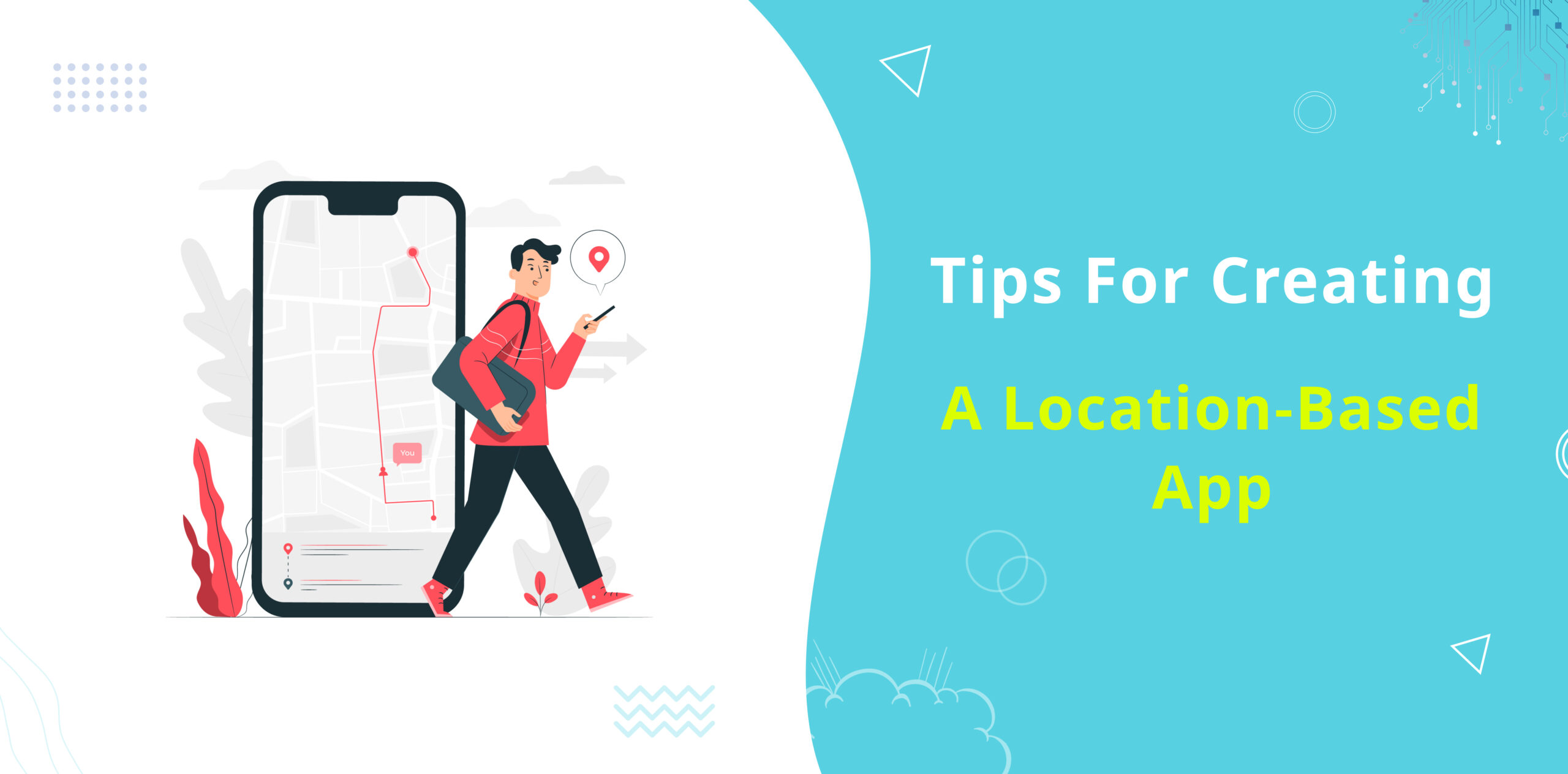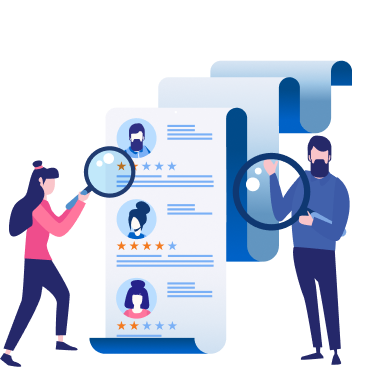Location-based apps are very popular these days. Several smartphone applications provide geolocation functionality. But how do you make a location-based app or whether you hire a software development company, and how can it help your company?
Location-based smartphone applications aren’t simply for finding directions, locations, or people.
Retailers are already utilizing geofencing technology to convey notifications to customers who are nearby. Users of social networking applications can designate places while publishing text, video, or photographs. Weather applications leverage the user’s location to give notifications about current weather conditions.
Location-based smartphone apps have several applications. In this blog, we will look at the stages of developing location based apps, as well as crucial features and ideas for 2023.
Let’s get started
Tips for Creating a Location Based Apps
Location based apps are mobile apps that allow companies to provide their services depending on the user’s location. You can hire a software development company to develop such applications for you.
For example, you may have received a message from Google asking you to rate a restaurant where you recently dined.
Other organisations may use the same technology to deliver personalised warnings to their consumers’ geolocation. Wi-Fi, cell towers, and satellite/GPS data are used to transmit position information.
The essential question now is how this functionality aids organisations in improving their bottom line.
How Does A Location based Apps Benefit Your Business & Customers?
Location based apps are becoming increasingly popular in the corporate sector and also, the mobile app development industry.
You can easily discover applications with route-tracking tools for fitness clubs and restaurants, social network apps with geo-tagged photographs, dating apps with location services, and apps with map navigators.
The four primary functionalities of a location based app that set it apart are listed below.
- Information function: Informs the user about nearby things.
- Social function: The ability to know the position of other users.
- Communication function: The ability to register a location on the map, offer comments on a location or read other people’s reviews, and attach your content (a photo or a text message) to a specific location on the map.
- Marketing function: Targeted incentive marketing initiatives for customer connection.
Let’s take a look at how firms might utilise these features to target and engage potential consumers.
Provide Reliable and Timely Services
Location based apps such as Uber enable businesses to provide accurate and timely services to their clients.
GPS technology assists in pinpointing your customer’s actual position, allowing you to supply your items or services with pinpoint accuracy in record time. As a result, it contributes to the development of trust among your consumers.
Relevant Offers in Real Time
Companies may utilise location based applications to send relevant promotional offers to their clients at the right moment.
Such applications can assist businesses in connecting with their target consumers and reaping the benefits of localization. Companies also collect data on their customers’ activity and create customised marketing programs.
Enhanced User Experience
The user experience of your software may make or break it. Businesses in certain industries, like travel, may improve user experience and engagement rates by including geolocation capabilities with the help of the software development company.
A location-based travel app, for example, can allow its users to:
- Check the route and how to go from one point to another.
- The weather forecast, as well as the weather in the location they are expected to visit.
- The most popular trips in the area.
- The local events and performances.
- There are historical sites to see as well as renowned sights.
Similarly, a delivery service app can enable clients to:
- Track the finished goods in real-time.
- Check the product’s status.
- Determine the product’s predicted arrival date.
A dating app can also allow its users to:
- Meet in their favourite location.
- Connect quickly within a specified radius.
Virtual Tour and Navigation
Businesses have begun to use the notion of augmented reality with location-tracking, which allows for remarkable navigation and virtual tours.
Adding geolocation features to your app can also:
- Increase conversions
- Increase user engagement
- Bring in new consumers. Furthermore, offer high-quality data for company promotion.
Key Characteristics of Location Based Apps
Here are some of the features that are becoming popular in the realm of location based apps, also custom software development company in the business are offering such services
-
Making the Map the App’s Interface
A basic news feed interface is no longer fashionable; its use is regarded as obsolete. Instead of the newsfeed, using a map as your location based apps UI is a fantastic feature. As a result, users may follow any location-based modifications in real-time.
-
Notifications
Location apps can connect with consumers more effectively by sending out useful alerts. Users can get information about the day’s discounts, risky conditions, or just timely information about future activities in their neighbourhood.
The user will not have to scroll to discover information since once it is tagged in a location-based platform, the user is alerted immediately.
-
Information filter
Location-based information filtering falls under a distinct category. As a result, they can store a large quantity of supplementary information.
A valuable feature is when users can simply filter the information they need and receive reminders just on the themes they have selected. Furthermore, the user can filter out information that is irrelevant to them.
-
Suggestions Customised
Sending individualised recommendations is a wonderful function. Once the software learns more about the user, it may deliver customised suggestions about local events, news, and others based on the user’s profile, hobbies, and who they follow.
-
Program of Reward
It’s a fantastic feature for small businesses, For example, users can earn points or collect awards for attending certain activities. Later, they may be able to trade these points for free admittance.
-
AR based on location
Augmented reality and position sensors, when paired with GPS, are likely to alter the way we connect and move about our actual, physical area.
The user experience for sharing data, photographs, and other information on a location-based network will be fantastic.
Trending Ideas for Creating Incredible Location based Apps
Geolocation services provide a lot of possibilities for app development. Check out these popular ideas for developing apps with excellent location-based features.
-
Apps for Health and Fitness
An excellent health and fitness app is constantly in high demand. By using location services, several features may be added to make it an appealing app for consumers.
It can assist users in keeping track of their training activity. GPS data may track a user’s walking, cycling, and running routes, as well as other fitness activities such as swimming.
You may add extra features that allow users to hunt for a local jogging companion or a spot to get a bite of nutritious cuisine after the workout.
-
Navigation and Tourism
Consider employing a mobile app linked with AR and location services to provide your customer with a guided tour of a new city.
This software may guide the user through the city by providing a virtual tour as well as updates on local businesses and attractions.
-
Social Networking Based on Location
Users of such applications can specify a radius within which they want to participate in public conversation.
This app might also include features like live video streaming to keep you up to speed on what’s going on around you, identify local parties for travellers, or find support groups in a new place.
-
Hospitality
Hotel applications that use geolocation can provide features such as self-check-in/out and mobile restaurant menus. Electronic keys can also be enabled using in-car navigation systems.
Making a Location Based Apps: A Step-by-Step Guide
The stages outlined below show how to approach the creation of a location based app.
So, let’s get this party started!
-
Investigate the Market and Look for Opportunities
The first step in developing a successful location based apps is to research the market. It’s critical to start by studying comparable geolocation applications on the market and their distinguishing characteristics.
This data may be used to identify the gaps your app is expected to cover and serve as a comprehensive solution to the problem you’re attempting to tackle.
You must also complete the following:
- Speak with a few potential users to learn about their expectations.
- Examine the ratings of comparable applications.
- Investigate the domain’s current market leaders.
- Create a One-Of-A-Kind Idea
After you’ve reviewed the competing services, perform the following:
Make a list of your app’s distinctive features that will appeal to users and set you apart from your competition.
-
Choose a Trustworthy App Developer
The competence of the app developer or app development business determines the success of your app. Your app concept might become a reality if you work with the proper app development firm.
It is critical to:
- Hire software developers that have the necessary knowledge and a strong portfolio in the field.
- Request a list of previous location based applications made by the app developer or the software development company. Install these applications to test their usefulness.
- Remember that the app firm is unlikely to outperform itself on your project in comparison to its past apps.
- Check to see if the software development company has experience with the platform you want for your app: Android or iOS.
- Search for the best price and quality mix.
- Choose the Best Technology Stack
The app platform – iOS, Android, or Web – and the app’s business objectives dictate the app’s tech stack.
To get the most exact and accurate location data from the user’s device, you must include the appropriate location-based SDK (Software Development Kit) in your program. Maps based on Google Maps data may be added to your program using the Maps SDK for Android and iOS.
In addition to utilising Google Maps SDK, Apple MapKit for iOS may be used to show the position on a map. Both are completely correct, although there are variances in data quality, routes, augmented reality, offline maps, and privacy.
Android devices are located via the Google Location Services API. It consumes little power and can pinpoint the user’s location via GPS, Wi-Fi, and cellular networks.
Other frameworks to explore if you want to add more location-based features to your project are HERE, OpenStreetMap, MapBox, Foursquare API, and Facebook Places.
When making your decision, keep in mind that GPS-based apps quickly consume a user’s battery. Take care to make these programs as speedy and dependable as possible.
-
Determine the Functions
The following are the primary elements of every geolocation app:
- A map view
- Detection of the user’s location
- Route planning
- Locator of places around me
- Notifications based on location
- History of the Location
Depending on the goal of your app, you can add more functions. For example, you might add a function to:
- Determine the radius
- Ratings and suggestions
- Sharing your location with your contacts
- The weather prediction is plotted on a map.
- Photo-based location search
- Traffic congestion updates in real-time
Remember to keep the number of features in your app’s initial edition to a minimum. Building an MVP initially is recommended since it is a low-risk technique for validating your idea.
- Make UX and UI
- Make a graphic mockup of your app.
Begin thinking about how your app will appear and which screens it will include. Your app’s design should be simple and easy to use. This will help to validate your idea.
- Make the app more secure.
With stronger data security rules, it is advised that the app’s security be prioritised. During this stage, your app will be tested for security and data privacy.
Users’ data is the most precious asset you may have, so make sure you have suitable systems in place to gather, store, and handle any possible security issues. You must: Work on data security to ensure the security of your GPS app.
Keep in mind that unintentional deletion of files and folders might result in data loss. You will need data recovery software in this situation.
Make certain that your app complies with local legislation in the countries where you intend to market it.
-
Develop and test
The code is completed throughout the development period. This is where the backend coding takes place. You should never underestimate the significance of app testing. Thorough testing aids in the removal of problems and the assurance of code quality. And for this, you need to hire a well-researched software development company. Your app is ready for launch once it has completed all of the preceding phases.
Conclusion
With ByteCipher, you can create a powerful location-based app. We can happily assist you in developing the finest location based apps for your company.
As said previously, geolocation technology is the future of app and software development. Choose the best location based application choice for your budget and target audience. You may always utilise the same models and source code as well-known organisations such as Uber and Booking.com.
You may also incorporate your favourite geolocation technique or combine several for greater accuracy. GPS modules and Augmented GPS operate together to determine latitudes and coordinates accurately.
Don’t forget to include intriguing features in your app. To attract more people, employ account creation, file exchange, and chatting.


























